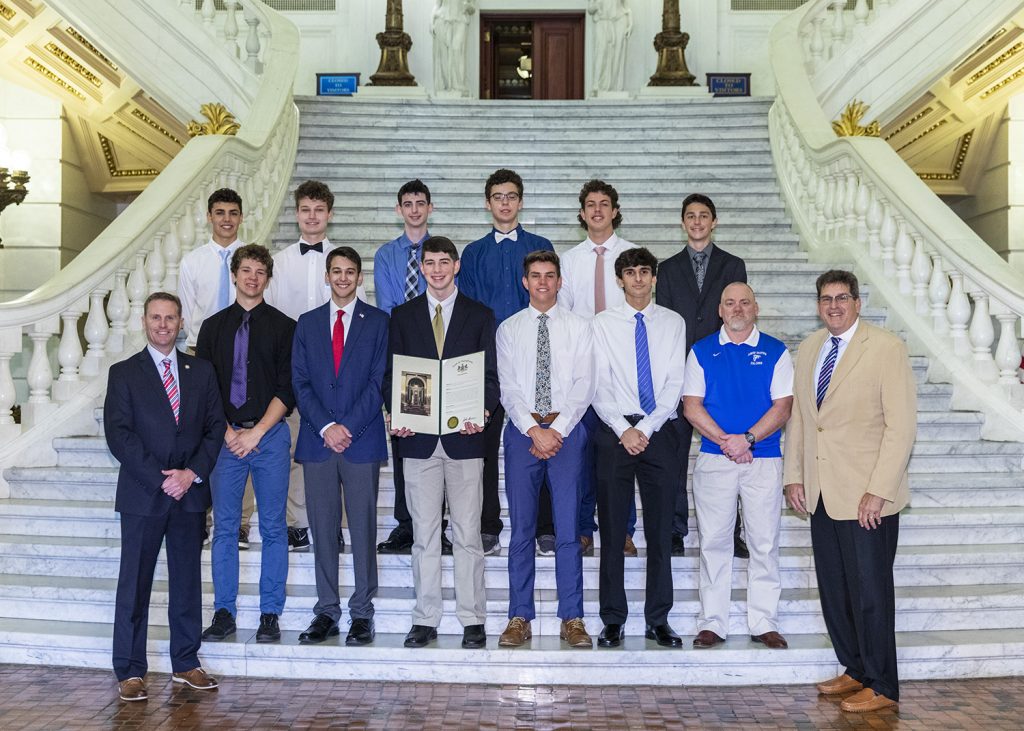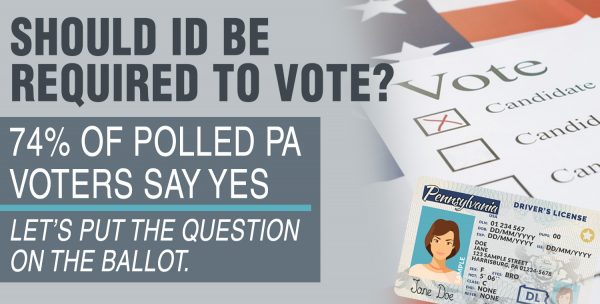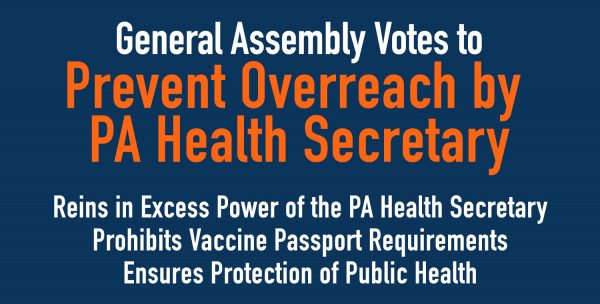|
View this email in a browser
In this Update:
- DiSanto’s Banking & Insurance Committee Approves Bills to Assure Patient Access to Medical Care
- Senate Approves DiSanto Bill Ensuring Consistent Contractor Bonding Requirements
- Work Continues on 2021-22 State Budget
- Senate Passes Plan for Voter Verification Constitutional Amendment
- Senate Sends Bill to Rein in Health Secretary’s Power, Ban Vaccine Passports to Governor’s Desk
- Bill to Expand Senior Access to Prescription Drugs Approved by Senate
- Measure Offering Optional Year of Education Due to COVID-19 Goes to the Governor
- Senate Votes to Permit Local Police Radar for Traffic Safety

Senators John DiSanto (15th District) and Chris Gebhard (48th District) present a Senate Citation to the Lower Dauphin High School Boys’ Volleyball Team for their 2021 PIAA State Class AA Championship.
DiSanto’s Banking & Insurance Committee Approves Bills to Assure Patient Access to Medical Care
As Chairman of the Senate Banking & Insurance Committee, I held a voting meeting this week to approve bills to assure patient access to medical services and prescription drugs, authorize telemedicine services, ensure annuity recommendations are in the consumer’s best interest, and modernize the insurance agent licensing process.
Senate Bill 225, introduced by Senator Phillips-Hill, seeks to streamline and standardize the prior authorization of medically necessary health care services and prescription drugs. Health providers report many administrative barriers when obtaining insurance company approvals for tests, medications, and procedures that have led to unnecessary delays in patient care. This legislation imposes timely deadlines to expedite prior authorization and important protections to respect the doctor-patient relationship and need for individualized treatment.
Reforming the prior authorization process is essential to improving the patient experience. Patients ought to have access to appropriate treatments in a timely manner, and I look forward to continuing to lead negotiations between key industry stakeholders as this legislation advances.
Senate Bill 705, introduced by Senator Vogel, expressly authorizes the use of telemedicine services in Pennsylvania. The bill establishes guidelines regarding who can provide telemedicine services and provides clarity regarding insurance company reimbursement for those services.
Telemedicine played an instrumental role in patient access to quality health care services during the pandemic. This legislation ensures patients will continue to enjoy the convenience and innovation of telemedicine services well into the future.
Senate Bill 772, a bill I introduced, improves the marketing and financial stability of annuities by updating Pennsylvania’s annuity law to reflect changes made by the National Association of Insurance Commissioners. The legislation imposes a higher standard of conduct on insurance agents and brokers to require all annuity recommendations be in the consumer’s best interest.
House Bill 1349, introduced by Representative Pickett, permits the Insurance Department to electronically process national criminal history records. The bill modernizes and expedites the background check process for insurance brokers and agents.
These bills now go to the full Senate for consideration.
Senate Approves DiSanto Bill Ensuring Consistent Contractor Bonding Requirements
This week the Senate unanimously approved my legislation to clarify the dollar amount municipalities retain as financial security from builders and contractors for property improvements, ensuring capital resources are deployed productively for the Commonwealth’s development needs.
Senate Bill 208 clarifies the Municipalities Planning Code regarding final development plan approval and the retention of posted financial securities for improvements. The law’s intent is to ensure developers have enough funds to complete all required property improvements. However, the current language can be misinterpreted to withhold excess funds and greatly restrict the ability for contractors to get bonded for other projects.
Instead of a municipality only retaining a bond of 110% of the value of remaining property improvements, some local jurisdictions have interpreted the law to retain 10% of the entire original project amount in addition to the cost of remaining improvements.
My proposal balances the financial interests of municipalities with the Commonwealth’s construction and development needs. At a time when our economy is still recovering, it’s important to fully leverage private sector financial resources into shovel-ready and family-sustaining jobs for our residents.
The bill now goes to the House of Representatives for further consideration.
Work Continues on 2021-22 State Budget

Work continued this week on finalizing a state budget for the 2021-22 fiscal year. Earlier this year, Gov. Tom Wolf proposed a huge spending plan with a massive increase in the personal income tax. A majority of lawmakers in the Senate and House of Representatives rejected the plan.
Look for a report on the new budget in next week’s e-newsletter.
Senate Passes Plan for Voter Verification Constitutional Amendment

The Senate this week approved a plan to allow voters to decide if the Pennsylvania Constitution should be amended to require identification each time a voter casts a ballot.
Currently, voters are required to show identification only the first time they vote at a polling place. The proposed constitutional amendment asks voters to decide if some form of verification should be required every time a ballot is cast, including when voting by mail.
A recent poll by Franklin & Marshall College found 74% of Pennsylvanians favored requirements that all voters show a photo ID and only 25% opposed. Nationally, that number climbs to 80% in support of some sort of identification to vote and drops to 18% opposed, according to a Monmouth University poll.
With Gov. Tom Wolf’s refusal to consider legislation that asks voters to provide verification every time they vote, the Senate passed a bill to place the issue on the ballot as a proposed constitutional amendment so voters can decide. Unlike a piece of legislation, constitutional amendments do not need the governor’s approval.
Senate Sends Bill to Rein in Health Secretary’s Power, Ban Vaccine Passports to Governor’s Desk

The Senate gave final approval of legislation that prevents the excess use of power by the state Secretary of Health and prohibits vaccine passport requirements while ensuring the protection of public health.
The measure prohibits the Secretary of Health from mandating those who have not been exposed or in close contact with the exposed to wear a mask, stay at home or be socially distant. It also prevents the secretary from using the same laws to force business closures.
It also prohibits the state, as well as counties, municipalities, school districts and colleges that are subsidized by state taxpayers from requiring proof of vaccination. The measure will now go to Gov. Wolf’s desk. He will have 10 days to sign the bill into law, veto it or allow the bill to become law without his signature.
Bill to Expand Senior Access to Prescription Drugs Approved by Senate

Legislation to expand senior access to prescription drugs received Senate approval and was sent to the House of Representatives for consideration.
The measure:
- Expands the income eligibility of the PACENET senior prescription drug program by $6,000 for both individuals and married couples;
- Removes the requirement that a PACENET cardholder pay a monthly premium; and
- Provides the department with discretion to have cardholders enrolled in a Medicare Part D plan that meets their prescription needs.
The anticipated savings from enrolling eligible PACENET individuals in Medicare Part D plans will provide enough savings to cover the cost of the income expansion.
Measure Offering Optional Year of Education Due to COVID-19 Goes to the Governor

Parents would have the option to allow their children to repeat a grade level due to learning disruptions caused by COVID-19 under a bill approved by the Senate and sent to the governor.
In current practice, the decision on whether to hold a student back is made solely by the child’s school and teacher. The bill would only apply to the 2021-22 school year to address learning gaps related to the pandemic.
Senate Bill 664 would also give parents the option to extend enrollment in special education programs for an extra year due to COVID-19. This provision would prevent students with special needs from aging out of the system at age 21 after missing out on much of the specialized attention they need due to COVID-19 disruptions.
Gov. Wolf will have 10 days to sign the bill into law, veto it or allow it to become law without his signature.
Senate Votes to Permit Local Police Radar for Traffic Safety

The Senate approved and sent to the House of Representatives legislation permitting municipal police in Pennsylvania to use radar for speed limit enforcement.
Speeding is the leading contributor to fatal crashes after DUI and 30% of fatal speeding crashes occur on local roads. Pennsylvania is the only state that prohibits municipal police from using radar to enforce speed limits.
The new enforcement tool would come with several restrictions:
- Prohibiting convictions if the speed recorded is less than 10 miles per hour over the speed limit where the posted limit is less than 70 miles per hour.
- Setting a revenue cap on the amount of money a municipality may keep from speeding tickets at no more than 10% of its municipal budget.
- Requiring a municipality to adopt an ordinance before allowing police to use radar.
- Setting calibration standards for the use of radar guns.
|










